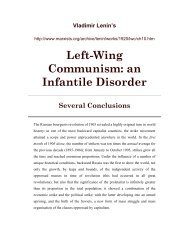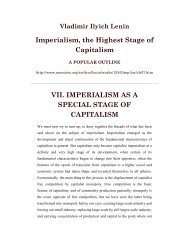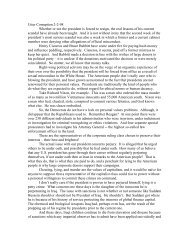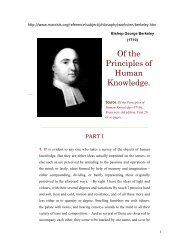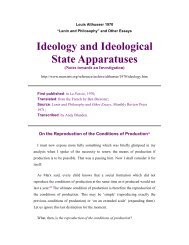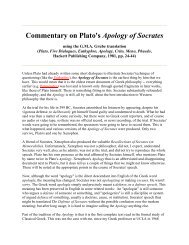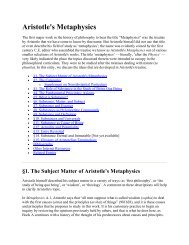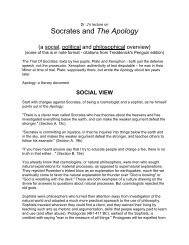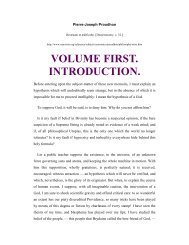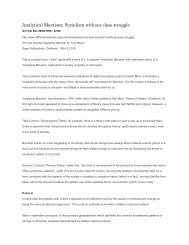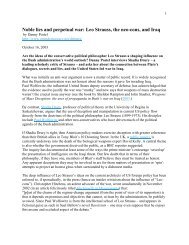Albert Camus (1913â1960) - Richard Curtis
Albert Camus (1913â1960) - Richard Curtis
Albert Camus (1913â1960) - Richard Curtis
You also want an ePaper? Increase the reach of your titles
YUMPU automatically turns print PDFs into web optimized ePapers that Google loves.
philosophy that accepts and approves, and in its own way blesses, our dreadful mortality<br />
and our fundamental isolation in the world.<br />
c. Themes and Ideas<br />
Regardless of whether he is producing drama, fiction, or non-fiction, <strong>Camus</strong> in his mature<br />
writings nearly always takes up and re-explores the same basic philosophical issues.<br />
These recurrent topoi constitute the key components of his thought. They include themes<br />
like the Absurd, alienation, suicide, and rebellion that almost automatically come to mind<br />
whenever his name is mentioned. Hence any summary of his place in modern philosophy<br />
would be incomplete without at least a brief discussion of these ideas and how they fit<br />
together to form a distinctive and original world-view.<br />
i. The Absurd<br />
Even readers not closely acquainted with <strong>Camus</strong>’ works are aware of his reputation as the<br />
philosophical expositor, anatomist, and poet-apostle of the absurd. Indeed as even sit-com<br />
writers and stand-up comics apparently understand (odd fact: <strong>Camus</strong> has been used to<br />
explain episodes of Seinfeld and The Simpsons), it is largely through the thought and<br />
writings of the French-Algerian author that the concept of absurdity has become a part<br />
not only of world literature and twentieth-century philosophy, but of modern popular<br />
culture as well.<br />
What then is meant by the notion of the absurd? Contrary to the view conveyed by<br />
popular culture, the absurd, (at least in <strong>Camus</strong>’ terms) does not simply refer to some<br />
vague perception that modern life is fraught with paradoxes, incongruities, and<br />
intellectual confusion. (Although that perception is certainly consistent with his formula.)<br />
Instead, as he himself emphasizes and tries to make clear, the absurd expresses a<br />
fundamental disharmony, a tragic incompatibility, in our existence. In effect, he argues<br />
that the absurd is the product of a collision or confrontation between our human desire for<br />
order, meaning, and purpose in life and the blank, indifferent “silence of the universe.”<br />
(“The absurd is not in man nor in the world,” <strong>Camus</strong> explains, “but in their presence<br />
together. . . it is the only bond uniting them.”)<br />
So here we are: poor creatures desperately seeking hope and meaning in a hopeless,<br />
meaningless world. Sartre, in his essay-review of The Stranger provides an additional<br />
gloss on the idea: “The absurd, to be sure, resides neither in man nor in the world, if you<br />
consider each separately. But since man’s dominant characteristic is ‘being in the world,’<br />
the absurd is, in the end, an inseparable part of the human condition.” The absurd, then,<br />
presents itself in the form of an existential opposition. It arises from the human demand<br />
for clarity and transcendence on the one hand and a cosmos that offers nothing of the<br />
kind on the other. Such is our fate: we inhabit a world that is indifferent to our sufferings<br />
and deaf to our protests.<br />
In <strong>Camus</strong>’ view there are three possible philosophical responses to this predicament. Two<br />
of these he condemns as evasions; the other he puts forward as a proper solution.<br />
12



